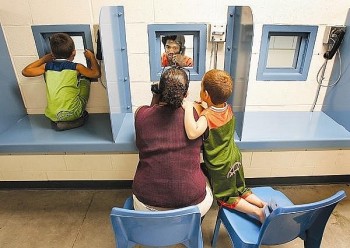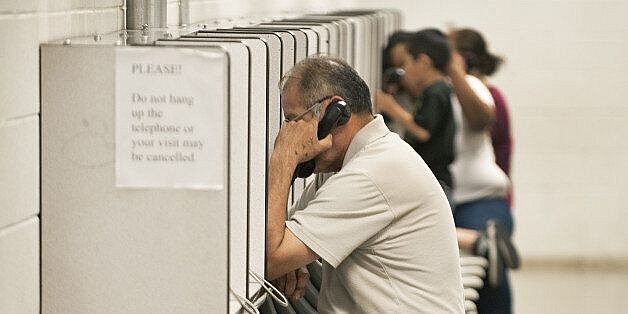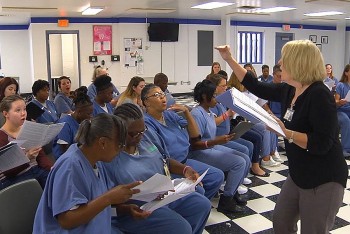How Inmates Make Phone Calls In Prisons
 Top 10+ Most Luxurious Prisons In The World Top 10+ Most Luxurious Prisons In The World |
 4 Easiest Steps to Visit a Prisoners in the U.S (Federal and State Prisons) 4 Easiest Steps to Visit a Prisoners in the U.S (Federal and State Prisons) |
 |
| How Inmates Make Phone Calls In Prisons |
Inmates in the American jail system are not permitted to own or use cell phones, yet this does not appear to be preventing them from making calls and utilizing social media. Many people ask how prisoners may obtain smartphones in prison, especially because inmates are posting messages and even images from within their cell.
How Prisoners Communicate With the Outside
Prison is an extremely isolated experience, and many convicts immediately feel disconnected from reality after beginning their term. Many inmates value maintaining contact with loved ones, acquaintances, and the rest of the outside world, which promotes smuggling and contraband circulation in American jails.
Some convicts circumvent the system without using contraband by having friends or relatives maintain their social media profiles, respond to messages, or pass comments from images and other posts. While these convicts may operate well socially, this remains a very limited mode of communication with the outside world. Smuggling will continue to be a problem in many prisons due to the allure of social media and society's overwhelming need to keep connected with the outside world. While particular prisons may establish rules to reduce the number of contraband cell phones found in their cells, the problem is likely to persist until convicts have a more reliable means of communicating with their contacts on the outside.
READ MORE: Guantánamo Bay Detention Camp: History, Costs, Prisoners And More
How does an inmate gain access to telephones while in prison?
During Admissions and Orientation (A&O), offenders learn how to get a Personal Identification Number (PIN) and set up a calling/messaging list. Inmates are permitted to have twenty (20) numbers on their approved calling/messaging list. Inmates cannot use another inmate's PIN or disclose their PIN with another inmate. Violators face disciplinary punishment.
Inmates can use their tablets to access telephones or make calls, subject to the facility's guidelines.
Telephone/tablet access is a privilege. Inmates must follow institutional phone usage restrictions or risk losing their privileges at any time. Phone use restrictions will be enforced on offenders whose status would interfere with the institution's disciplined operation.
READ MORE: Top 10+ Largest Prisons In The U.S By Population
What types of calls are convicts permitted or prohibited to make?
Inmates may make local and long-distance collect or debit calls. Debit calling was enabled in September 2002.
Third-party phone calls are not allowed.
Who pays for the calls?If the convict places a debit call, his phone account is deducted for the cost of the call. If an inmate makes a collect call, the person who accepts it is responsible for the expense of the call. The recipient must accept the collect call charges. If a family member or friend on an approved calling list creates an account linked to their phone number, the calls will be charged at the debit call rates. |
How many phone calls may an inmate make each day?
Prisoners may make more than one phone call each day provided they use pre-approved phone numbers. Furthermore, as previously stated, offenders are permitted up to 300 minutes of jail phone conversations every month. In November and December, the prison Warden may permit an additional 100 minutes, in addition to the 300 minutes allowed, to encourage family contact over the holiday season.
Jail phone hours are limited. While hours can begin as early as 6:00 a.m. and end as late as 11:30 p.m., most prison phone calls are restricted during the hours when convicts are expected to be at their work assignments (usually 7:30-10:30 a.m. and 12:30-4:00 p.m.).
In addition, phone calls are limited to 15 minutes. Prison wardens also establish a waiting period between phone conversations, and back-to-back calls are often prohibited. In most circumstances, offenders must wait one hour after their last jail phone call before making another call. These restrictions may make it difficult for inmates to make many jail phone calls in the same day.
| Do you know..? Federal detainees are given a PIN and a phone card, and they can only make calls to permitted recipients. However, some numbers are automatically included on the phone card (for example, the police). Federal inmates must make a request to have someone added to a call list. The permission process can take up to 15 days, so federal offenders may be unable to contact family, friends, or lawyers for the first few days or weeks of incarceration. Typically, offenders receive one phone call within the first 24 hours of admission. Telephone access varies by institution. Each institution has its own set of regulations and practices for making calls, and convicts may have their own unofficial guidelines for using the phone. |
Are inmates' phone calls monitored?Yes. Outgoing phone conversations from convicts may be monitored and recorded, unless they are made to an attorney or an organization recognized to provide legal services. Notices are displayed near inmate telephones, informing them that their calls may be monitored and/or recorded. It is the inmate's responsibility to request or arrange for the use of a non-monitored phone for confidential attorney/client communications. |
Can convicts get incoming calls?No. Inmates are not permitted to receive phone calls unless an emergency exists and/or permission has been given by the Warden. |
Other methods to contact prisoners
Electronic messaging has become a common mode of communication in most American households and businesses, and it may now be used to keep inmates linked to their family. The Trust Fund Limited Inmate Computer System (TRULINCS) application allows inmates and the general public to exchange electronic messages in a secure environment. Maintaining familial links after the inmate's release increases the likelihood of a successful reintroduction into the community, lowering the risk of recidivism.
Sending Mail
The Bureau of Prisons encourages offenders to write to family, friends, and other community connections in order to retain links while incarcerated. Written correspondence is categorized as either general or special mail.
Sending packages
Inmates are not permitted to receive packages from home without prior written consent from their unit team or an authorized staff member at the facility. The only shipments that an inmate can receive from home are those providing release apparel and permitted medical devices. Inmates may get magazines, hardcover and paperback books directly from the publisher.
States in the US that allow free phone calls for prisoners
In 2019, New York became the first big metropolis to provide inmates with free phone calls.
Connecticut, Minnesota, Colorado, and California have also offered free jail phone calls.
In December 2023, Massachusetts joined other states in providing free jail and prison phone calls to convicts.
Conclusion
Inmates' communication choices are limited, resulting in unreasonably high expenses for calls between them and their relatives. Telephone/tablet access is a privilege. Inmates must follow institutional phone usage restrictions or risk losing their privileges at any time. Phone use restrictions will be enforced on offenders whose status would interfere with the institution's disciplined operation.
 How Many Prisons/Prisoners Are There In Florida? What Are The Most Dangerous Prisons? How Many Prisons/Prisoners Are There In Florida? What Are The Most Dangerous Prisons? How Many Prisoners Are There In Florida? What Are The Most Dangerous Prisons? All of those questions will be answered in the article below! |
 Top 10+ Most Luxurious Prisons In The World Top 10+ Most Luxurious Prisons In The World When you think about prison, you probably envision iron bars, dismal corridors, terrible food, and an overall sense of despair. What if we told you ... |
 Simpliest Ways to Send Money to a Prisoner in the U.S (Federal or State Prison) Simpliest Ways to Send Money to a Prisoner in the U.S (Federal or State Prison) If you have relatives, friends, or colleagues in a US prison, you can help them by sending money. KnowInsiders.com will walk you through the simplest ... |
























